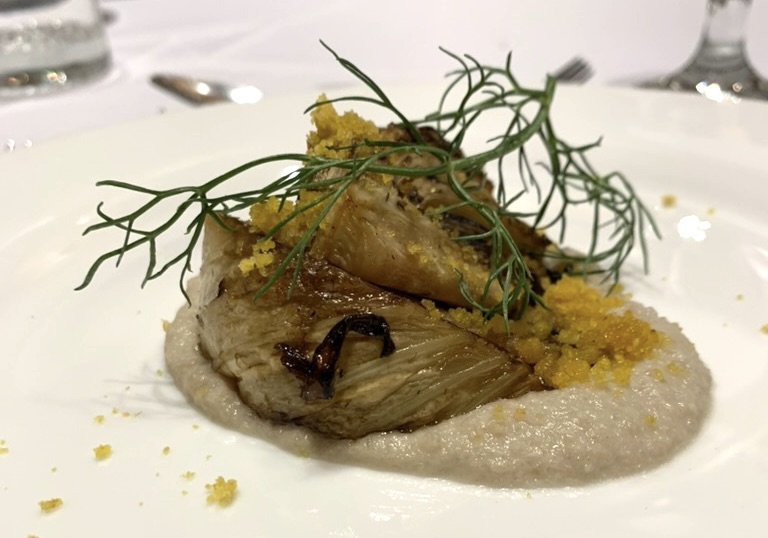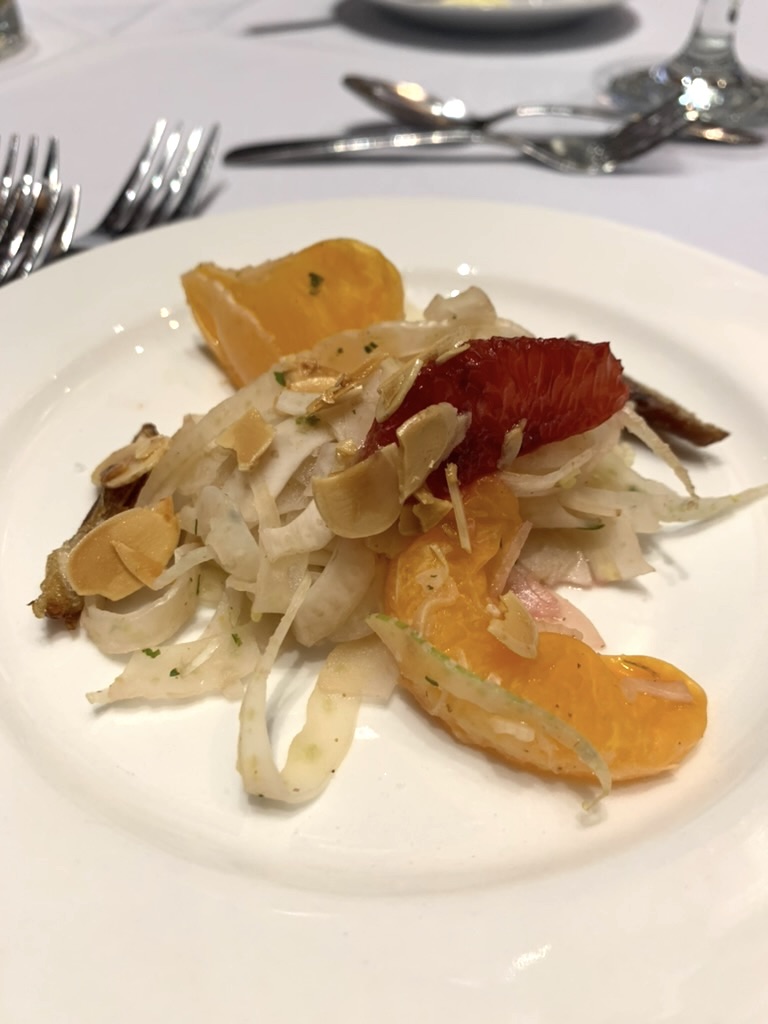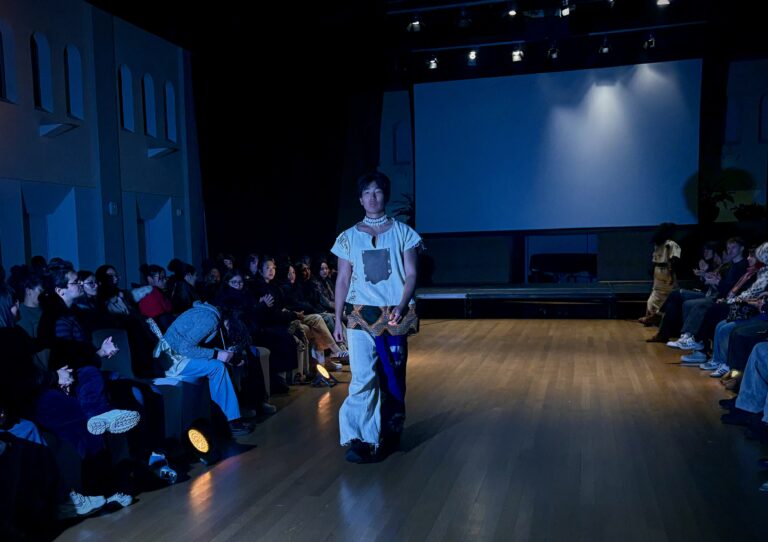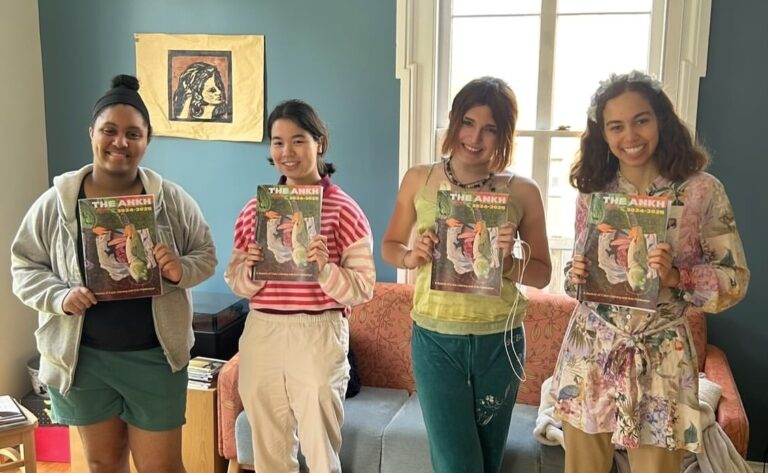An Delicious Evening With Bryant Terry: Chef, Activist, Author, Community-Builder

On Wednesday, March 29, The College of the Environment hosted “An Evening With Bryant Terry,” inviting members of the community to a cooking demo, dinner, fireside talk, and book signing with Terry, a vegan chef, activist, author, and community-builder. Last week, our food team attended the event, tried the food, and conversed with Terry, learning more about his life and his relationship to food.
The Event: An Evening With Bryant Terry
Large round tables laden with rows of polished silverware and pristine white tablecloths filled the room. At the front was a stage and a counter covered with a cornucopia of seasonal vegetables and fruits. A makeshift kitchen consisting of a hot plate and a few assorted utensils sat behind. This was the scene for Bryant Terry’s dining event hosted by The College of the Environment and executed by Bon Appétit last Wednesday in Beckham Hall.
Director of the College of the Environment Barry Chernoff began the proceedings by introducing Terry to those who had managed to secure tickets to the coveted event. As an author, artist, food justice and sustainability advocate, publisher, and more, Terry is far from just a vegan chef. Over the course of the event, Terry debuted several recipes from his new book “Black Food: Stories, Art & Recipes from Across the African Diaspora” (2021), pairing each dish with a song he associated with the food.

After a short bout of technical difficulties, Terry started his cooking demonstration with a dish of curried tofu and mustard greens. From the moment he began, it became clear that for Terry, cooking is not just a practice but an act of radical protest and cultural remembrance. He sang songs he heard in his grandmother’s kitchen growing up, reflecting on the sights and smells of her Southern farmhouse.
Between cooking tips—never forget to press your tofu—he explained the importance of cooking with fresh and local produce as well as the barriers that low income and people of color in the United States often face when trying to access these resources. As the delightful odor of fried garlic and mustard seeds graced our nostrils, he explained what originally brought him to cooking: the Black Panther Movement. He was inspired by their free breakfast and lunch programs and notably, their critiques of the American food system.
Now down to the meal. First up was the curried tofu, infused with mustard seeds and mixed with stewed greens. With a sharp, bitter, spicy, and creamy flavor profile, this vegan concoction was delectable and was one of best bites I’ve had on campus this year. It didn’t take me long to empty my plate and wipe it clean with the pretzel bread with which we were provided.

As we waited for the next course, I sipped on the hibiscus and ginger infused beverage. Perfectly sweet and biting, it was akin to the kombucha I often purchase from Weshop. Before I could finish my glass, plates of fennel and citrus salad were placed on the table in front of me. Complete with dates and a citrus vinaigrette, the dish was crisp and refreshing. This was followed by a second appetizer of citrus and garlic-herb braised fennel. With two perfectly charred quadrants, this dish offered a completely new take on fennel and was unrecognizable from the previous course. Beneath the fennel was an intensely flavored sunchoke cream that had been mixed with plantain powder and had the consistency of grits.
By the time the main course arrived, we were positively stuffed but ready for another delicious bite. Diners like me were treated to a bean bean burger made of whole royal corona beans, mixed with tomatoes and broccoli rabe, and topped with a parsley persillade. While the combination of flavors proved to be somewhat bitter, I appreciated the heartiness of the plant-based burger as well as its garlicky herbaceous spread. Let’s just say, I ate every bite.
As we all know, there is always room for dessert, especially when it comes in the form of an oatmeal lace cookie and vanilla bean ice cream. Creamy, crunchy, and cinnamon-y: the dessert was the perfect sweet treat to complete the lengthy meal. Five sets of cutlery later, the meal had finally come to a close.
With that, my stomach was full and my mind was abuzz with Terry’s radical ideas on food culture in America. Students, faculty, Middletown residents, and guests alike sat together talking about the meal they had just shared and the knowledge they had just learned. The whole experience was a practice in community, and food was what had brought us together.
Lia Franklin can be reached at lfranklin@wesleyan.edu.
A Conversation with Bryant Terry
Earlier this week, I had the pleasure of getting to know Bryant Terry, the renowned chef and food justice activist. Besides being a successful cookbook author and inspirational figure within the culinary world, Terry possesses a wealth of knowledge and passion when it comes to unpacking the relationship between cooking, food, race, and class. Despite all of his many accomplishments, Terry remains incredibly humble, giving credit to his mentors, like Alice Waters, and acknowledging his place in history.
“People have been doing this work for decades well before I did, and I think it’s always important for me to, you know, recognize that I’m standing on the shoulders of so many who’ve come before me,” Terry said.
Terry, a Memphis native, described many of the formative experiences he had while visiting relatives on their farms throughout the South. It was there that he learned to love the land he was raised on and value his connections to agriculture.
“I’d say my paternal grandfather spending time in his garden was one of the main things that helped me feel connected,” Terry said. “I used to hate being in the hot sun and weeding, you know, his garden and shelling corn peas and shucking corn and all that…but I understand now, especially as a parent, that my grandfather was imparting skills that would be life changing. And so I do credit my grandparents for so much of the work that I’m doing.”
Sadly, his family doesn’t own this land anymore, which is reflective of the decreasing numbers of Black farm-owners in recent years. From predatory action by the USDA to rapid urbanization, farmers of color are quickly disappearing from the American South. Terry highlighted that by 1997 there were fewer than 20,000 Black farmers, a sharp decline from the one million Black farmers cultivating land during the 1920s. He stressed the importance of putting the power back in the hands of the people, a process that begins with controlling the production of the food we consume.
While his style of cooking is vegetable-based and many of his cookbooks intertwine veganism with food justice and sustainability, Terry rejects the label of “vegan chef.” His work amounts to much more than just a vegan or vegetarian diet; he seeks to emphasize healthy diets that are based around community organizing and farming in a way that connects people back to their land. Terry ultimately wants to connect complex justice initiatives back to a simple pleasure that we can all share: eating.
“I felt like the conversations often started with the very heavy intellectual ideas around food or public policy,” Terry said. “I always argued that we needed to start where we can meet everyone, which is something that’s more practical, more sensual, you know, everybody loves to eat.”
Looking at the bigger picture, Terry aims to focus on systemic issues. Although he noted that community action is vital, federal regulation is key to shaping the way our small farms can get traction in a corporation dominated market.
“For these larger political goals that I have around improving our food system, ensuring that everyone has access to healthy, fresh, affordable food, ensuring that the subsidies aren’t just going to the big multinational corporations, but are actually going to the small midsize farmers who actually need it,” said Terry.
To achieve this, Terry emphasized the need for unconventional thinking and working outside of our current capitalist structure. That said, he made a point of stressing that we must first work to meet the basic needs of people.
“How can we help support people who just need their basic survival needs,” asked Terry. “You know, I think about the Black Panther Party for self-defense, who’s a big inspiration for my work. They were clear that until you meet the basic needs of people living on the margins, who cares about revolution? Who cares about changing the system when I can’t even feed my baby, when I don’t have a vehicle to go to the doctor?”
Talking to Terry was inspirational because of his ability to make a meal about so much more than food. Still, at a base level, his food conveyed how it all ultimately comes back to what’s on people’s plates. His intersectional discussion of food justice is intertwined with his variety of interests outside of cooking. Terry’s new project revolves around his new art studio and desire to create art that reflects and visualizes sustainability issues and solutions. And while he may step away from the publishing world to focus on his new passion for art, that isn’t to say that more cookbooks aren’t on the way, so stay tuned for the next vegan-cooking masterpiece by Chef Bryant Terry.
Lewis Woloch can be reached at lwoloch@wesleyan.edu.








Leave a Reply